This was truly a collaborative effort. I was fortunate in the writing of this book to have a wealth of friendships and their diverse array of professional experiences that I could draw upon. Thank you to all my family and friends (and parents of friends), who contributed their social and business stories and bits of communication wisdom. I enjoyed hearing many of the stories for the first time, and was grateful to be able to share them. Once again experiencing the full measure of these connections, especially the deep generosity that flowed my way, has been a gift itself.
Thank you to my writing buddy, Patti, who provided such helpful input chapter by chapter. Her comments were right on and, I think, really helped me to create a book that is consistently enjoyable to read.
Much love and gratitude go to my husband, Tracy, my greatest supporter, who has always provided a safe and giving atmosphere in which to explore and grow my writing endeavors.
I thank my agent, Pamela Brodowsky, for having faith in my writing skills. That confidence manifested in this opportunity, for which I am very happy to have been presented.
Finally, thank you to book editor Danielle Chiotti for the chance to plunge into a project that has been a wonderful learning experiencereminding me how important it is to reach out to touch other lives.
Introduction
Ask people about their most embarrassing moment and youre likely to hear a story about how they made a fool of themselves in front of people they wanted to impress! At such times, we could swear that the universe had conspired to make us look foolish. So what gives?
The truth is that when cool and sophisticated is the goal, we can often end up being comical and nerdy instead. Part of this is trying too hard and nerves getting the best of us. For some, perhaps theres a little self-fulfilling prophecy coming into play. And, being unprepared doesnt help anyone. But the biggest reason we feel so foolish is that we take it all oh so seriously. Theres a tendency to overdramatize the importance of interactions in unfamiliar social and business affairs in which we feel we come up short. Mistakes feel HUGE! So huge that you have a hard time forgetting, even years later, that you referred to the groom by his new wifes ex-boyfriends name during your congratulatory speech, or the time you asked the adorable guy you had just met what he did for a living and when he said garbage collector you laughed and told him to stop kidding you when he wasnt.
In the short term, keeping perspective can help manage your frustration level and limit the duration of self-berating. For long-term success, having some small talk social skills in your repertoire and some mingling mojo at your disposal will come in mighty handy. It makes all the difference in both the actual handling of a given situation and the way you feel about your performance. Think of it this way: Putting yourself in unfamiliar situations can be like skiing down a steep slope. If you have confidence in your skiing skills youre more likely to enjoy the challenge, to try those skills out to see what works. On the other hand, if youre up on that slippery slope with no real skills to help you down, youre apt to be intimidated. The odds also increase that you will be a little or a lot out of control on your way down. Yet even that doesnt have to be a total disaster if you have the right attitude. Being able to laugh at yourself can be a real face-saver and what you learn from missteps is always a positive outcome.
The Small Talk Handbook starts with the premise that everyone longs to be at ease, at their best, in social situations. People naturally want to be viewed as confident and astute in business encounters. This includes everyone from movie stars and CEOs to social neophytes and new employees. Even though there are those people who seem born socially savvy, most everyone gets nervous from time to time about being in unfamiliar social territory and about making the right impression. Preparedness goes a long way toward evening up the playing field. As does taking the attitude that social and business encounters are opportunities, a game you can have fun with once you know the rules of engagement.
The Small Talk Handbook reviews the basics of being prepared for new encounters whether they are of a romantic, friendly, or professional nature. This includes setting the tone with a helpful attitude, being aware of the body language connection, knowing how to naturally engage others with conversational prompts, and how to politely move the mingling along. The Small Talk Handbook lists tips for listening, being open and friendly, and knowing how much to reveal about yourselfand when. It also explores ideal interaction at work functions and how to get the most out of business relationships. This book was created to benefit women and men, of all ages, who are single or partnered, for use in both work and playful environments. Special care has been given to address issues specific to the following groups or individuals.
- Dating prospectors of any age, who are new to, awkward in, or freshly back in the dating scene
- Naturally shy people who have trouble feeling at ease in a cross section of social situations
- Interaction fumblers searching for small talk dos and donts tips
- Career strivers wanting to have greater impact in the business arena
- Tongue-tied romantics who lose their speaking facility in the vicinity of their hearts target
- Lackluster party mixers not getting the results theyd like from their current social interaction
- Networking novices wanting to gain tools for successfully obtaining and using business contacts
- Meek minglers ready for a more proactive participation in social encounters in order to gain greater satisfaction from social and business activities
- Business generators honing their communication skills and wanting to expand their opportunities
- Upper-echelon reactors who get nervous around more important peers or associates
- Image-enhancement seekers interested in being more intriguing, interesting, and appealing
- Communication enthusiasts always on the lookout for ways to improve upon and expand their interactions with other people
- New arrivals (to a new town or in a new job) needing tips for creating social connections
The Small Talk Handbook is more common sense and practical information than rocket science, which is a good thing when you only have a few minutes or so to make a dynamic first impression. It is written to be a fun read that easily enables you to access the topics most important to you. In addition, it is designed as a valuable reference you can use as you perfect your knack for chatting people up, and talking about yourself in an appealing fashion that both puts yourself and others at ease and gets you taken more seriously. Time to socialize.
CHAPTER 1
Small Talk Starter Kit
Social ease is equal parts exposure, expenditure, and experience. You cant master small talk if you dont put yourself out there. Its necessary to expose yourself to a variety of situations that call upon you to turn strangers into acquaintances, to refresh past acquaintances, and to build upon established relationships. Communication competence results from expending the necessary energy to be aware of your surroundings and the people in your personal landscape. It is affected by appropriate consideration of the place and personality, and by the effort you put into your interactionshow much you send out and how you react. Comfortable chitchatting and mingling come with experience and lots of practice. You should find yourself at greater social ease, and enjoying yourself more spontaneously and less self-consciously, as your small talk skills improve and positive experiences accrue.

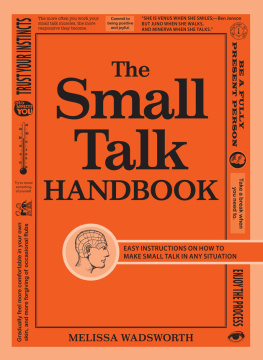
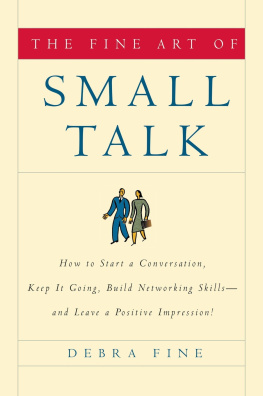
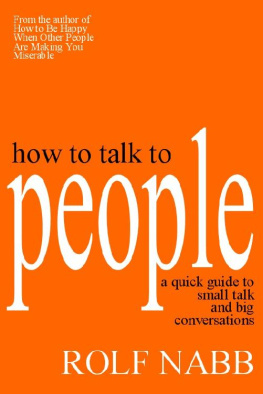
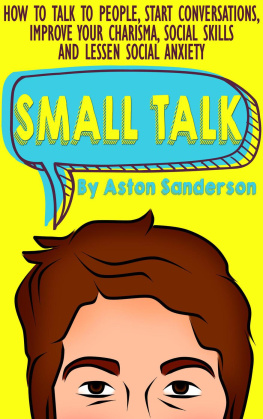
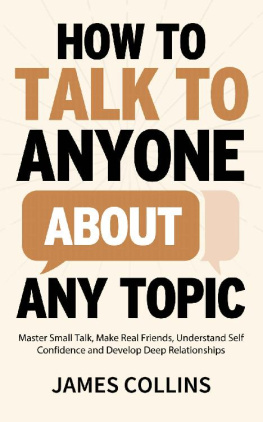

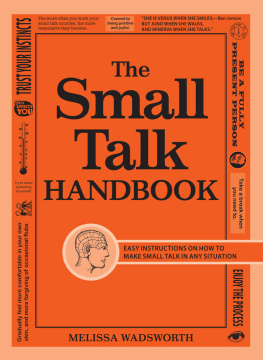
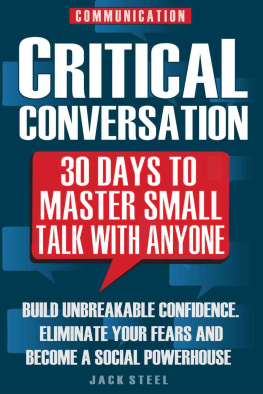
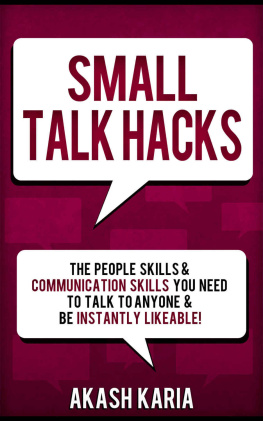
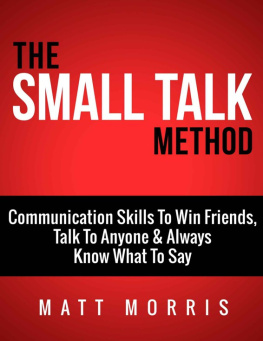

 EASY INSTRUCTIONS ON HOW TO MAKE SMALL TALK IN ANY SITUATION
EASY INSTRUCTIONS ON HOW TO MAKE SMALL TALK IN ANY SITUATION